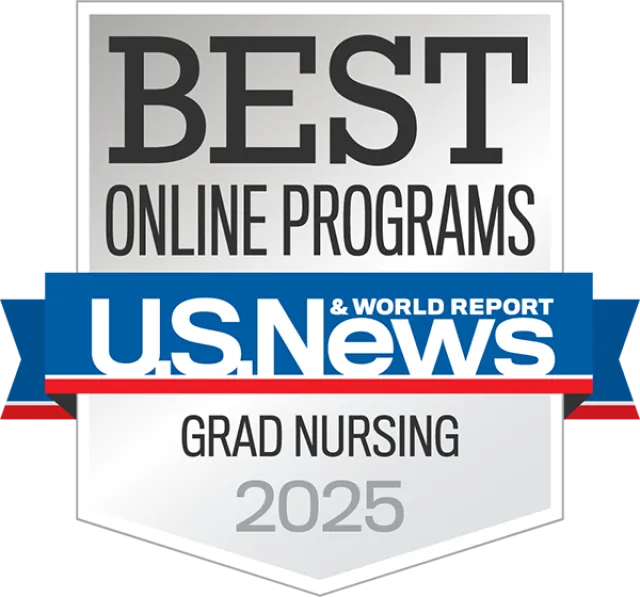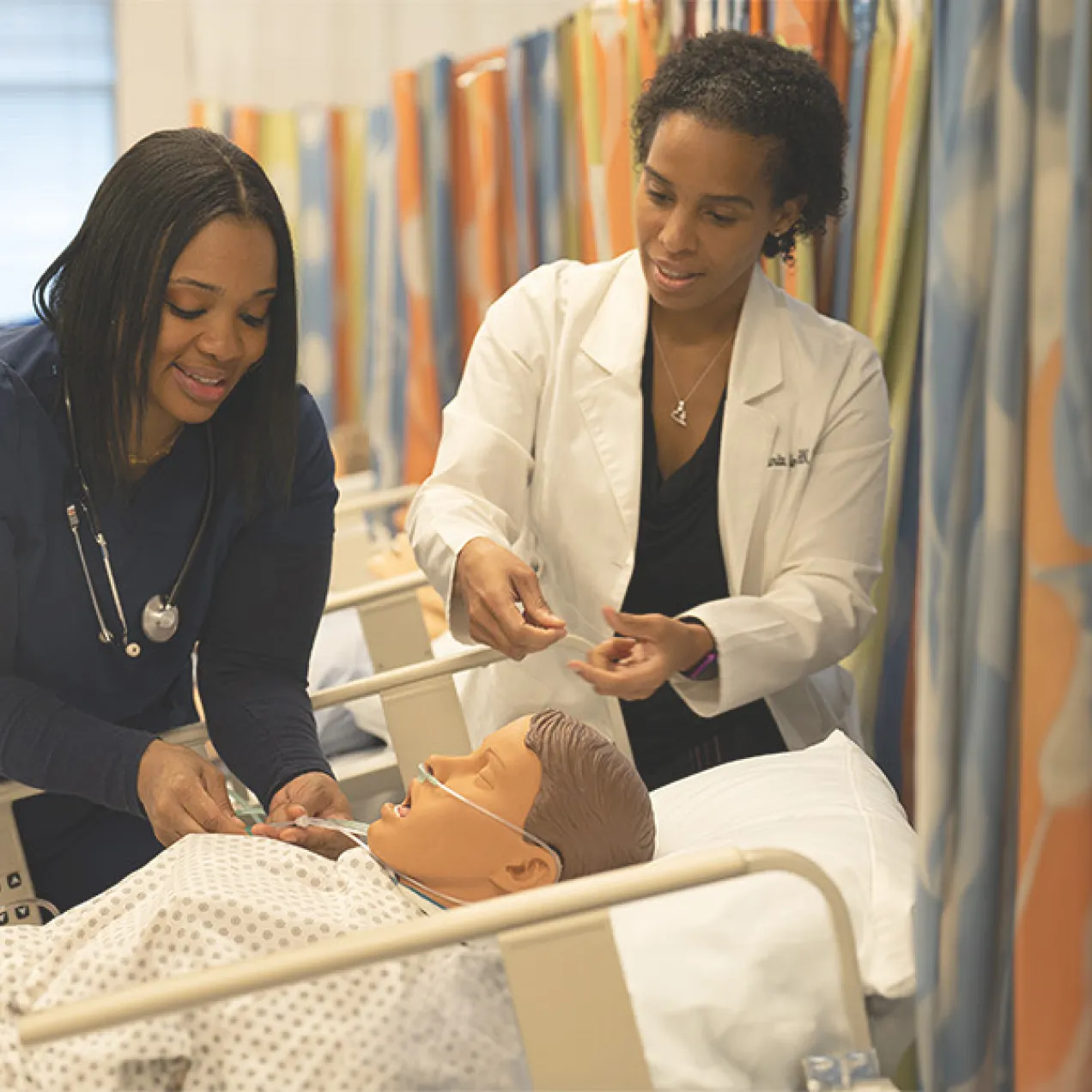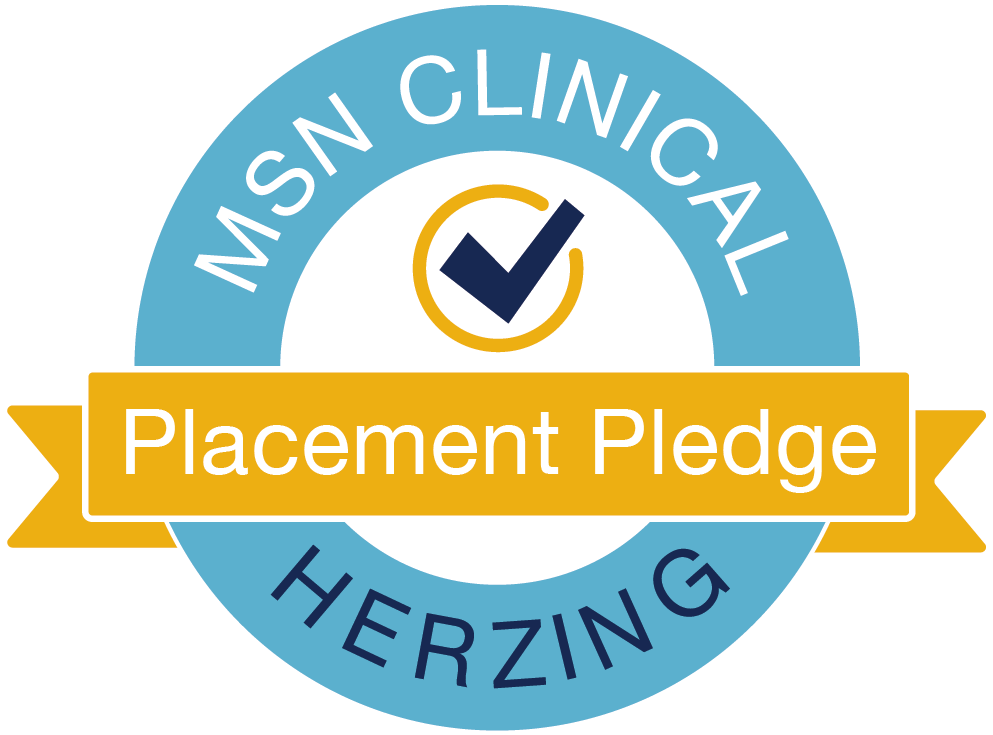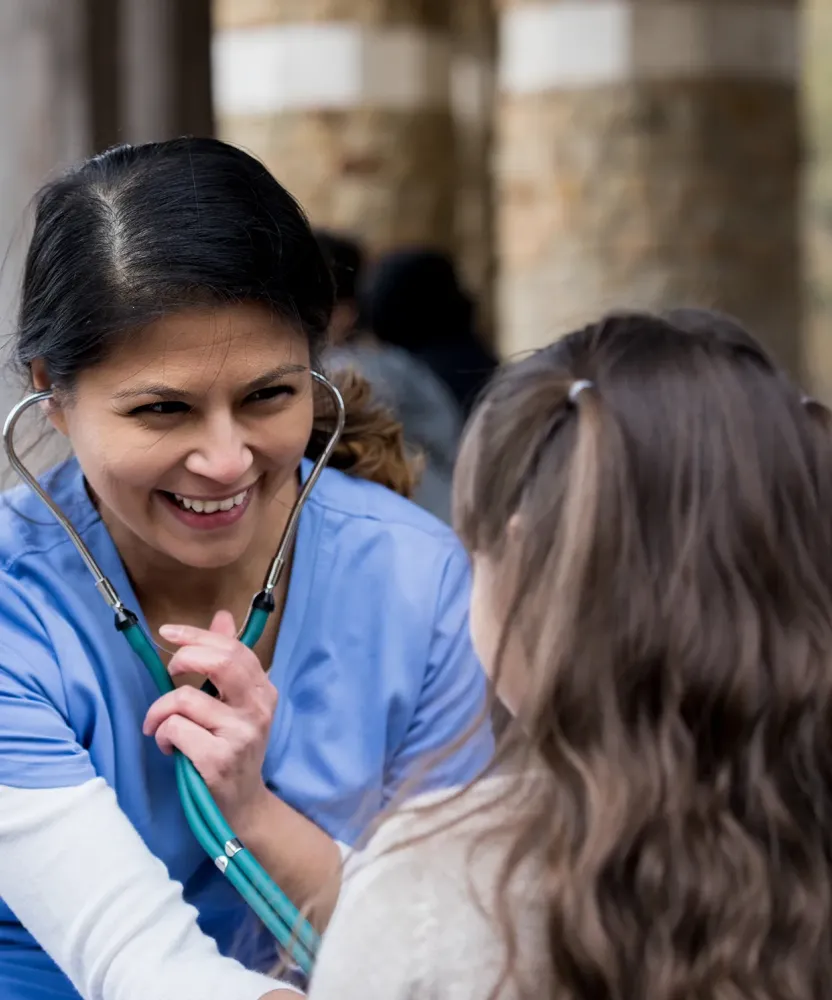Bridge to the next level in your nursing career
| Accreditation | CCNE accredited,1 Accredited by the Higher Learning Commission |
|---|---|
| Paying for school | You can earn up to 85% in loan forgiveness through the Nurse Faculty Loan Program (NFLP)2 |
| Clinicals | Hands-on clinicals—we pledge your clinical placement! |
| Format | 100% online classes |
| Pathways | Go from ADN to MSN in Nursing Education in our accelerated RN to MSN program, or earn your BSN on the way in our RN to BSN to MSN track |
| Dual credit | Earn dual credit towards a Doctor of Nursing Practice (DNP); build a foundation to pursue a Doctor of Nursing Education |
| QuickPaths | Transfer credit, stackable credentials, and adaptive learning technology build a faster pathway to a higher education with Herzing University |
Learn More Today!

Ranked by U.S. News & World Report as one of the best online graduate nursing programs in 2025
Accelerated Online RN to MSN-Nursing Education
The RN to Master of Science in Nursing in Nursing Education is a 52-credit graduate program (RN to MSN) which prepares you for a career as a nurse educator.
The online degree program provides students with fundamental knowledge and skills in health policy and management, theoretical foundations for nursing, teaching/learning strategies, curriculum development and evaluation, and much more.

Career-focused curriculum
Discover the crucial knowledge and skills required to succeed in your work and build a foundation for continued career growth.
Flexible schedule
We work hard to help you maintain school-life balance, striving to be as flexible as possible for busy non-traditional students.
Virtual services
Access to extensive virtual services, including academic advising, tutoring, support services, technical support and library services.
Lifelong support
We support your ongoing career advancement by providing comprehensive, personalized student services with lifelong career coaching.
Rolling admissions
No application deadlines to worry about. Apply when you’re ready and prepare to get started soon.
Pathways
Choose your path to go from RN to MSN-NE
RN to BSN to MSN-NE Track
RN to BSN to MSN-NE Track
- Curriculum built to help earn your BSN and MSN faster
- How long? 28 total months on average
- Earn a bachelor’s degree that is often required by employers
Accelerated RN to MSN-NE
Bridge directly from an ADN to MSN in Nursing Education in the Herzing Accelerated RN to MSN program.
- Curriculum built to accelerate your MSN-NE completion
- How long? 20 months on average
- Ideal for nurses who are not required by their employer to hold a BSN
Classes and curriculum details
The Herzing RN to MSN in Nursing Education degree program prepares students for both academic and clinical roles in nursing education, from core undergraduate nursing courses to graduate-level courses refining specialty skills in nursing education.
All classes are delivered online with 180 total required clinical hours.
RN to BSN to MSN-NE track
This track combines our online RN to BSN and BSN to MSN-NE degree programs. You can view their respective curriculums with all course information here:
| Program | Months i | Semester Credits |
|---|---|---|
| Master of Science in Nursing (MSN) in Nursing Education - Accelerated RN-MSN (MSNNEA) | 20 | 52 |
i. Average number of months for students to complete program.
Required Bridge Courses
All courses, 16.00 semester credit hours, are required prior to completing graduate level coursework.
Required Core Courses
All courses, 15.00 semester credit hours, are required.
Required Direct Care Courses
All courses, 9.00 semester credit hours, are required.
Required Specialty Courses
All courses, 12.00 semester credit hours, are required.
Tuition & Cost
Tuition & Cost
The cost of tuition for the RN to MSN in Nursing Education program is $630 per credit.
You can potentially earn even greater savings by transferring credit from prior college coursework, applying for financial aid, or potential partnership opportunities through your employer.
Our goal is your career advancement. That’s why we are always working to improve our curriculum and processes to make our program as affordable as possible while preparing you best for success in your work.
Scholarships & Financial Aid
You may be eligible for multiple scholarships and grants—including our Nurses Circle of Achievement scholarship, which offers up to 10% tuition reduction.
Military/Veteran Discounts
Veterans, Active Duty U.S. Servicemembers, and spouses may qualify for a 10-20% tuition discount.
You can earn up to 85% in loan forgiveness through the NFLP.
Commit to a career as a nursing instructor and you can potentially save immensely on cost as part of the National Faculty Loan Program (NFLP).
You’ll need to find a full-time position within 12 months after graduation. The longer you remain employed full-time, the more you can save—up to 85% over 4 years.2
Your clinical placement is our pledge.
We understand securing clinical placement as part of an rn to msn program is one of the biggest concerns students face. At Herzing, we offer guidance and support through our step-by-step Clinical Guidance Process to ensure you can get the clinical practice experiences you need.
As a Herzing student, we’ll encourage you to find your own preceptor and clinical sites as there are many benefits to doing so. However, we provide extensive support should you find difficulty along the way. With Herzing, you are never on your own.
Because of our strong relationships with healthcare providers across the U.S. and our comprehensive Clinical Guidance Process, we are confident in our ability to help you find clinical placement. So much so that if you are unable to find a clinical site on your own, we pledge to step in and help you secure clinical placement.*
* Subject to terms and conditions outlined in the enrollment documents.

RN to nurse educator program enrollment prerequisites
Enrollment requirements are the same whether you choose the accelerated RN to MSN or RN to BSN to MSN track. Prerequisites include:
- Live in a state where Herzing University is authorized to offer the RN to MSN program
- Hold a current, active and unrestricted license as a registered nurse (RN) in the same state in which they practice
- Hold an associate degree (ADN/ASN/AASN) in nursing from a nationally or regionally accredited college or university
- Participate in an interview to identify your goals and determine if the program is right for you
Eligible states for enrollment: Alabama, Alaska, Arizona, Arkansas, California, Colorado, Connecticut, Delaware, Florida, Georgia, Hawaii, Idaho, Illinois, Indiana, Iowa, Kansas, Kentucky, Louisiana, Maine, Maryland, Massachusetts, Michigan, Minnesota, Mississippi, Missouri, Montana, Nebraska, Nevada, New Hampshire, New Jersey, New Mexico, North Carolina, North Dakota, Ohio, Oklahoma, Pennsylvania, Rhode Island, South Carolina, South Dakota, Tennessee, Texas, Utah, Vermont, Virginia, West Virginia, and Wisconsin.
Waived Enrollment Fee
Discover the educational pathway designed to maximize your career potential. Reach for greater heights with Herzing University.
Meet Our Leadership

"Herzing University provides students with the knowledge, skills, and attitude to become a qualified nursing educator. The Nurse Educator program provides teaching and learning opportunities in both traditional academic settings, as well as a clinical-based settings for those who may wish to become a clinical educator.
Herzing’s knowledgeable and supportive faculty, as well as its robust curriculum, provide graduates with the tools they need to succeed as a nursing educator."
Brandy Ebert, DNP, RN, MSN-Ed, MBA-PM, BSB
Department Chair of Academic Programs (Online MSN)1Dr. Brandy Ebert is the Department Chair for Academic Programs for the Online Nursing Department, overseeing the RN-MSN, MSN, PMC in Nursing Education, Nursing Leadership and Administration, and Public Health Nursing programs. She also oversees MSN core courses, including theory, evidence-based practice, pharmacology, pathophysiology, etc.
Dr. Ebert has been in nursing education since 2010. In addition, she has served in leadership capacities and faculty at various institutions, in which she was responsible for teaching a variety of courses, curriculum development, simulation and clinical leadership, nursing instruction, faculty/student management, campus scheduling, clinical site acquisition, financial/supply maintenance, etc. During her tenure, she has also implemented a variety of new programs and initiatives, including master instruction, experiential learning, alternative clinical learning days, nursing education checklists and competency assessments, and a post-graduate mentorship program. She regularly engages with students and interacts with leadership to monitor program assessments/matrices and develop clinical and curriculum orientation processes and collaborative assessment tools.
Prior to nursing, Dr. Ebert had a science background with a bachelor’s degree in Biochemistry, and experience working a research laboratory for two years.
1MSN-Core Courses, MSN-Nurse Educator, MSN-Nurse Leader, MSN Public Health, & RN-MSN-A Programs
Your career options as a nurse educator
As a nurse educator, your role will be to help best educate nursing students and prepare them to transition from school to a professional working environment. You can work in a classroom, office setting, or teach in a hospital/clinic setting providing staff education and development.
Additional responsibilities may include:
- Supervising nursing lab and clinical education
- Demonstrate nursing through simulation activities and debriefing
- Delivering lectures and facilitating classroom discussion
- Provide feedback as students interact with patients
- Design curriculum and instruction to ensure courses meet state accreditation requirements
- Oversee student teaching, internships and research
Job outlook
According to the Bureau of Labor Statistics, employment of nursing instructors is expected to rise 17% from 2024-2034, well above the average across all U.S. occupations.*
Now is a great time to begin earning the education you need to join a rapidly growing field in healthcare.
How can I continue advancing my career? Nurse educators considering additional education or credentials in patient care may consider pursuing a post-master’s certificate in Family Nurse Practitioner (FNP).
The Student Experience at Herzing
I received endless encouragement while I was earning my degree! The love and support I received from everyone were incredibly motivating toward finding success.
Patricia Abbott
Nursing Student | Brookfield/Milwaukee CampusAccreditation & Disclosures
1. The master's degree program in nursing at Herzing University Madison is accredited by the Commission on Collegiate Nursing Education (http://www.ccneaccreditation.org). Herzing University is approved to offer programs in an online learning modality through association with the main campus in Madison, Wisconsin.
2. In exchange for post-graduation employment as nurse faculty meeting specific criteria, the program authorizes the cancellation of up to 85% of any such loan (plus interest thereon).
Herzing University is accredited by the Higher Learning Commission (hlcommission.org), an institutional accreditation agency recognized by the U.S. Department of Education.
* BLS pay estimates calculate the median annual wage for various occupations. Per the BLS the median wage for an occupation is: "The wage at which half of the workers in the occupation earned more than that amount, and half earned less. Median wage data are from the BLS Occupational Employment and Wage Statistics survey." Bureau of Labor Statistics (BLS), U.S. Department of Labor, Occupational Outlook Handbook 2024. BLS median wage estimates do not represent entry-level wages and/or salaries. Multiple factors, including prior experience, age, geographic market in which you want to work, and degree level and field, will affect career outcomes, including starting salary and earnings as an experienced employee. Herzing neither represents that its graduates will earn the median salaries calculated by BLS for a particular job nor guarantees that graduation from its program will result in a job, promotion, particular wage or salary, or other career growth.
Recent Blog Posts
Waived Enrollment Fee
Discover the educational pathway designed to maximize your career potential. Reach for greater heights with Herzing University.






